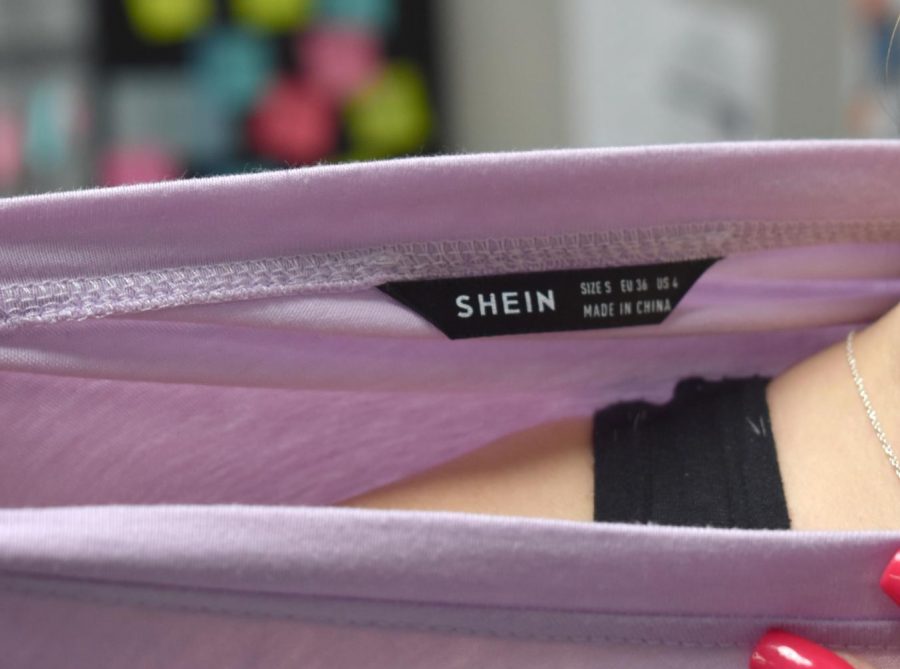Fast fashion dispassion
Buying from SHEIN contributes to global pollution
photo credit: Casi Thedford
To the brim \\ Stop supporting fast fashion. SHEIN is cheaply manufactured. It’s low prices contribute to an influx of sales which in turn causes landfills to overfill.
Fast fashion has been around for decades; however, with the rise of social media platforms such as Instagram and TikTok, it has become more prominent and problematic than ever. The term ‘fast fashion’ is used to describe cheap, up-to-date clothing designed, manufactured and shipped quickly so it is able to keep up with trends. One of the most popular fast fashion companies is SHEIN, which has a loyal customer base mostly composed of teens. While SHEIN and other companies like it may promise affordable and trendy pieces, there’s a darker side to this industry that’s leading to the rapid pollution consuming the Earth.
To preserve the Earth and its inhabitants for generations to come, teens should stop supporting fast fashion by purchasing from SHEIN and instead buy from thrift stores.
The reason why the prices are so shockingly low on SHEIN’s website is because the quality of the clothing is equally as cheap. What they sell isn’t made to last, but instead deteriorate within the first few weeks of use and get tossed out, leading to over 30,000 tons of clothes getting sent to landfills every day. Everything they sell is produced in factories and made of synthetic fabrics like polyester and nylon, which take centuries to decompose. Because the prices are so low, teens are able to just buy more products once their old ones wear out, leading to a cycle of harmful textile waste. The packaging SHEIN uses to individually case their products is also made of plastic, one of the most notoriously harmful substances to the environment when thrown away because it doesn’t decompose. Ever. After thousands of years it might appear to break down, but the microplastics will still be present, polluting Earth’s air and water for eternity.
With their low prices and constant additions to the styles they offer, it isn’t hard to see why buying fast fashion has become so addicting to teens around the globe; however, their trendiness comes at a cost, and not just to the environment. In the past, SHEIN has profited off of minorities by selling sacred Muslim prayer mats as “frilled decorative rugs” as well as produced pieces featuring harmful and offensive symbols, such as a necklace featuring a swastika. The Chief Marketing Officer of the company, Molly Miao, stated that SHEIN drops hundreds of new designs daily, so it’s not shocking that some of them are questionable. Nevertheless, there is no excuse for this kind of carelessness from such an influential and widespread company, especially when it offends so many people.
When presented with the facts about the environmental damage caused by fast fashion, the future seems grim; however, there are ways to halt the progression of this trend. An easy, eco-friendly alternative to buying from SHEIN is thrifting. Thrifting refers to buying gently used items for a fraction of the price they were originally sold for. One of the main appeals of SHEIN is that the clothing is affordable, although it comes at the cost of quality; at second hand shops like Goodwill and Salvation Army, students can buy equally affordable clothing that is of much better quality, as well as find vintage one-of-a-kind pieces. As opposed to the harmful cycle of fast fashion where people throw away their new but poorly made clothes, when people thrift and then donate old clothes that don’t fit anymore back to thrift stores, it creates a sustainable way to continue to consume fashion.
We only have one Earth, so it’s important to take care of it while we still can; one way teens can contribute to positive environmental change is boycotting SHEIN and other fast fashion companies like it by refusing to purchase their products, and instead opt for more sustainable ways of shopping such as thrifting.

Hello there! My name is Maggie Volpi, and I am this year’s Editor-in-Chief for Blueprint! I am a senior, so this is my third and final year on staff;...

Heads and tales
I teach my students all the workings of running news publications. This website allows us to showcase all the different journalistic styles...


